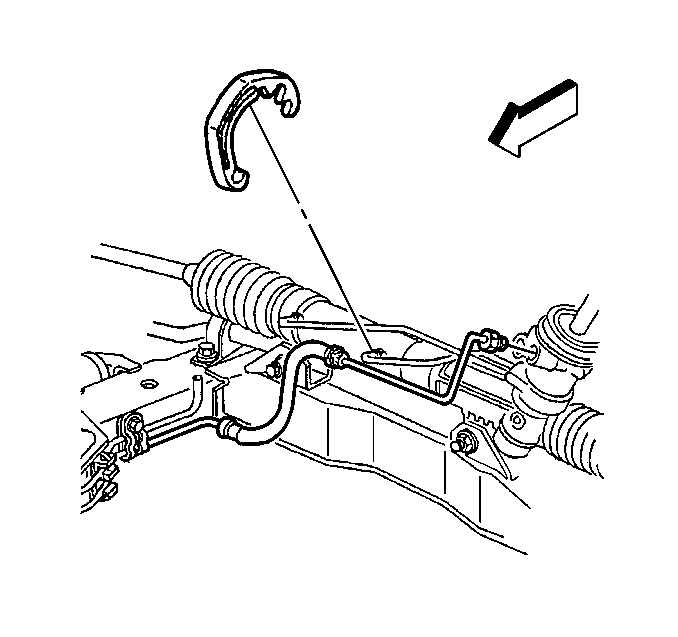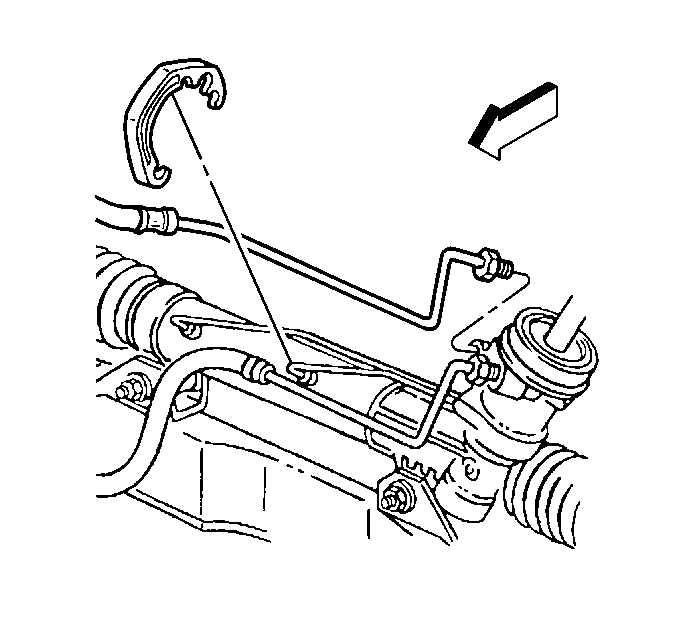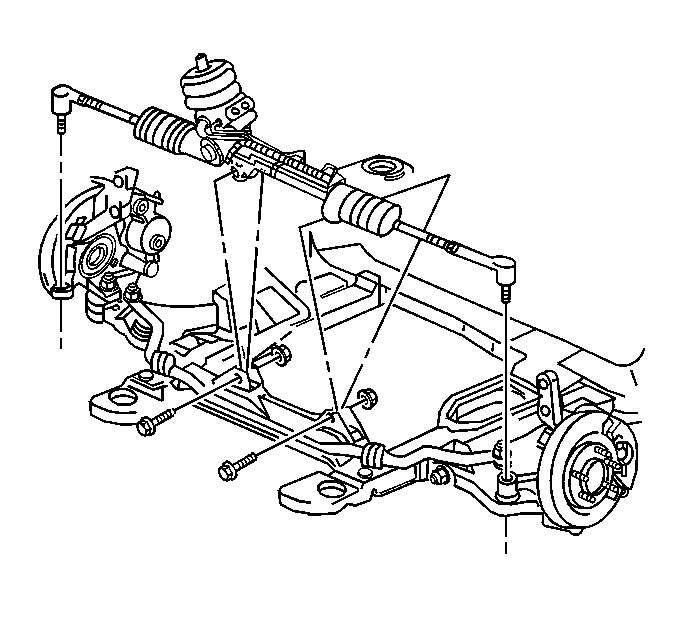Removal Procedure
- Raise and support the vehicle. Refer to Lifting and Jacking the Vehicle in General Information.
- Remove the stabilizer shaft. Refer to Stabilizer Shaft Replacement in Front Suspension.
- Remove the tie rod ends from the steering knuckles. Refer to Rack and Pinion Outer Tie Rod End Replacement .
- Remove the steering intermediate shaft from the steering gear. Refer to Intermediate Steering Shaft Replacement in Steering Wheel and Column - Tilt.
- Use a utility stand in order to support the frame.
- Remove and DISCARD the frame rear bolts. Refer to Frame Replacement in Frame and Underbody.
- Use the utility stand in order to lower the frame and the powertrain.
- Remove the power steering gear cooler pipe from the steering gear. Refer to Power Steering Cooler Pipe/Hose Replacement .
- Remove the power steering gear pressure hose from the power steering gear. Refer to Power Steering Pressure Pipe/Hose Replacement .
- Remove the power steering gear bolts and nuts.
- Remove the power steering gear through the vehicle left side wheel opening.
Notice: Set steering shaft so the block tooth on the upper steering shaft is at the 12 o'clock position, the wheels on the vehicle are straight ahead and set the ignition switch to the LOCK position. Failure to follow these procedures could result in damage to the coil.
Notice: Do not lower the rear of the frame too far as damage to the engine components nearest to the cowl may result.



Installation Procedure
- Install the power steering gear through the vehicle left side wheel opening to the frame.
- Install the power steering gear bolts.
- Install the power steering gear nuts.
- Install the power steering gear pressure hose to the power steering gear. Refer to Power Steering Pressure Pipe/Hose Replacement .
- Install the power steering gear cooler pipe to the power steering gear. Refer to Power Steering Cooler Pipe/Hose Replacement .
- Install the power steering gear cooler pipe retaining clip.
- Use the utility stand in order to raise the frame and the powertrain.
- Install the NEW frame rear bolts. Refer to Frame Replacement in Frame and Underbody.
- Remove the utility stand from the frame.
- Install the steering intermediate shaft to the steering gear. Refer to Intermediate Steering Shaft Replacement in Steering Wheel and Column - Tilt.
- Install the tie rod ends to the steering knuckles. Refer to Rack and Pinion Outer Tie Rod End Replacement in Power Steering System.
- Install the stabilizer shaft. Refer to Stabilizer Shaft Replacement in Front Suspension.
- Lower the vehicle.
- Fill the power steering system. Refer to Checking and Adding Power Steering Fluid .
- Bleed the air from the system. Refer to Power Steering System Bleeding .
- Inspect the system for leaks. Refer to Power Steering Fluid Leaks .
- Inspect and adjust the toe as necessary. Refer to Front Toe Adjustment in Wheel Alignment.

Important: This is a prevailing torque type fastener. This fastener may be reused
ONLY if:
• The fastener and its counterpart are clean and free from rust • The fastener develops 2 N·m (18 lb in)
of torque (drag) against its counterpart prior to the fastener seating.
Notice: Use the correct fastener in the correct location. Replacement fasteners must be the correct part number for that application. Fasteners requiring replacement or fasteners requiring the use of thread locking compound or sealant are identified in the service procedure. Do not use paints, lubricants, or corrosion inhibitors on fasteners or fastener joint surfaces unless specified. These coatings affect fastener torque and joint clamping force and may damage the fastener. Use the correct tightening sequence and specifications when installing fasteners in order to avoid damage to parts and systems.
Tighten
Tighten the power steering gear nuts to 80 N·m (59 lb ft).


